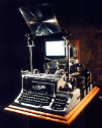

Is the lady below reminiscent of a worker near you? Or the second image,
of any computer you've ever seen? Actually, it's
a Mac.

|

|
I was browsing a second-hand copy of David Kyle's A Pictorial History of Science Fiction — one advantage of living in Oxford is the variety of books sold by charity shops, in this case the retro-stocked Age Concern on Cowley Road — and came across the picture, which I then managed to find on the Web. It's by Frank R. Paul, who did many of the covers for Amazing Stories, which Wikipedia tells me was the first magazine devoted solely to science fiction. And it's an illustration for Hugo Gernsback's series Baron Munchausen's New Scientific Adventures.
Everybody knows that the original Baron Münchhausen stories were fantasies about a German baron who did unlikely things. He danced a hornpipe inside a fish, landed on a floating island which drifted about between the North Pole and the Equator with bad effects on its sugar-cane crop, and even slept in Deptford. This quote is from Chapter XIX of The Surprising Adventures of Baron Munchausen by Rudolf Raspe:
My first visit to England was about the beginning of the present king's reign. I had occasion to go down to Wapping, to see some goods shipped, which I was sending to some friends at Hamburgh; after that business was over, I took the Tower Wharf in my way back. Here I found the sun very powerful, and I was so much fatigued that I stepped into one of the cannon to compose me, where I fell fast asleep. This was about noon: it was the fourth of June; exactly at one o'clock these cannon were all discharged in memory of the day. They had been all charged that morning, and having no suspicion of my situation, I was shot over the houses on the opposite side of the river, into a farmer's yard, between Bermondsey and Deptford, where I fell upon a large hay-stack, without waking, and continued there in a sound sleep till hay became so extravagantly dear (which was about three months after), that the farmer found it his interest to send his whole stock to market: the stack I was reposing upon was the largest in the yard, containing above five hundred load; they began to cut that first. I woke with the voices of the people who had ascended the ladders to begin at the top, and got up, totally ignorant of my situation: in attempting to run away I fell upon the farmer to whom the hay belonged, and broke his neck, yet received no injury myself. I afterwards found, to my great consolation, that this fellow was a most detestable character, always keeping the produce of his grounds for extravagant markets.The most unlikely part of the story is that he could remain in Deptford so long without being stabbed.
I took the quote from the archive at Project Gutenberg, which has over 30,000 free online books whose US copyright has expired. But unfortunately, although that got me Raspe's stories, I couldn't find Gernsback's New Scientific Adventures anywhere. However, I did notice a few lines at the bottom of the Pictorial History of Science Fiction illustration, not shown on the copy that I thumbnailed:
We could not rid ourselves of the idea that these females were some sort of secretaries to our host, and it was manifest that they were "working" at something. They appeared to be working earnestly and diligently, too, but there were no pencils, no books, no paper, no typewriters; in fact, there was nothing whatsoever that a terrestrial secretary requires to get up her superior's report.
Perhaps they were using the brain-computer interface described in Wisconsin-Madison University's April press report Researchers use brain interface to post to Twitter. But something in the frenetic stare of those tentacle-fingered typists reminded me of Terry Gilliam. Gilliam did direct a Munchausen film, The Adventures of Baron Munchausen, but it's another of his films I'm thinking of: Brazil. And of the typist who frantically transcribes as Sam Buttle is being processed by Information Retrieval — i.e. tortured:
What is that you are putting on my head?
AHHHH, Oh God...No, Don't ...
Uhh.Please... I...Stop!!
I Can't Stand....AIIEEEE
OOOOOOH...AAAAAHHH...PLEASE
The imagery in Brazil is simultaneously futuristic and old-fashioned, with hints of Art Deco. That includes the computers we see the typists using: clunky black keyboards and the insides exposed, with rays of light making dazzles and glares in thick glass swing-up lenses that seem to act as screens. And designer and writer Andrew Leman has made a working replica, which he shows off in The ElectriClerk: fully-functional retrofitted prop computer and Live-Action Roleplaying Props.
Leman writes that it's one of the most difficult and time-consuming pieces he's ever built. The keyboard is a 1920's Underwood typewriter, connected to a 1988 Mac SE. Clicking on his photo gives an enlarged image, in which you can just about see some radio valves, installed for artistic effect. The typewriter is mounted above the circuit board from the Mac's keyboard. Because 1923 Underwood typewriters don't have keys such as RETURN and OPTION, Leman had to treat these specially. The Mac's RETURN key is driven by the return lever on the top-left of the typewriter, via the silver rod running along the top and a cam on its right, which pushes another rod connected to the RETURN key beneath. I wondered what happened to the mouse: it's become a trackball, presumably the thing above the numeric keypad which mimics the style of the original typewriter.
To my knowledge, nobody has written Münchhausen's Adventures in the Software Trade. Perhaps if they had, he'd be using ElectriClerks in place of Windows. Or is an absence of Windows too much fantasy even for Münchhausen?